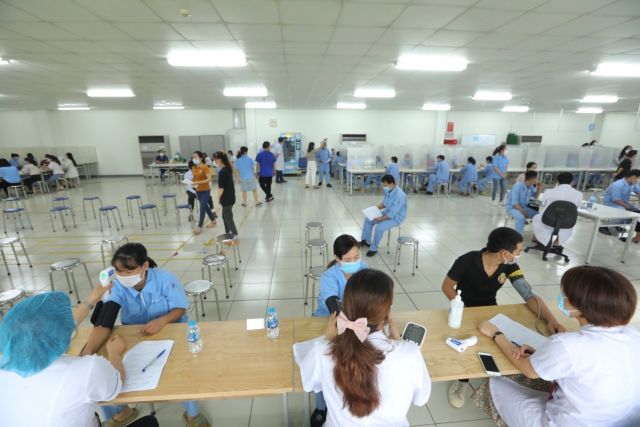Local businesses are struggling to recruit new employees due to a labour shortage caused by the fourth wave of COVID-19, according to authorities and business leaders.

Local businesses are struggling to recruit new employees due to a labour shortage caused by the fourth wave of COVID-19, according to authorities and business leaders.
Those who want to be employed must meet the requirements for "green cards", which includes being vaccinated against COVID-19. On top of this, businesses must also outline their plans to safely resume production. This has caused difficulties for both firms and employees.
An owner of a garment company in Binh Tan District of HCM City said that, since July 2021, his company has been among 45 firms to receive top priority for vaccinations because they are located in a high-risk zone. Despite this, not all employees and workers have been fully vaccinated yet.
He said HCM City has now offered incentives for businesses to reopen their production. However, only those with “green cards” are permitted to work, driving most businesses into difficulty due to a lack of labour.
Luong Van Vinh, general director of My Hao Cosmetics JSC, said that the ‘three-on-site’ policy means employees have to eat, sleep and work onsite to maintain production. Many of these workers have been given their first jab of the COVID-19 vaccine. However, many unemployed workers in big cities have not yet been vaccinated as they return to their hometowns. Vinh added that after HCM City lifts social distancing orders, many firms will face a hard time recruiting more employees, due to the mandatory vaccination requirement.
Le Nhat Truong, an official of Pousung Vietnam Co., Ltd in the southern province of Dong Nai, said that after two months of shut-down his company reopened and asked employees to come back to work on September 20. However, the company failed to reopen because not all staff are fully vaccinated, as required by authorities.
In order to lure workers back to work, Ba Ria-Vung Tau Province has allowed people with travel papers from their companies to use their personal modes of transport to travel to their workplace. Travellers must register their specific travel schedules, both to and from their homes and workplaces, said Le Ngoc Khanh, vice chairman of Ba Ria- Vung Tau Province’s People’s Committee.
Mass vaccination needed
Bui Xuan Huy, General Director of Novaland Group, said his company had 3,000 employees working in Ba Ria-Vung Tau Province. The company wants the provincial authority to allow them to transport the employees to HCM City for vaccination. Huy added his company has committed to ensuring safety when travelling to HCM City.
According to the Vietnam Association of Seafood Exporters and Producers (VASEP), mass vaccination is the most effective way to ensure workers can return soon. Currently, the ratio of vaccination amongst workers in industrial parks and processing zones is only 30-35 per cent for the first jab, while the ratio of workers who have received the second jab is less than five per cent.
Vice President and General Secretary of the Vietnam Cashew Association (VINACAS) Dang Hoang Giang said that most employees in the cashew industry have not yet received the second jab. Therefore, it was difficult to meet the requirements to reopen their businesses after the lifting of social distancing orders.
Giang said the vaccination ratio remains low in HCM City and neighbouring provinces. Therefore, workers should be given priority to get the vaccination to ensure safety for production. All should be fully vaccinated before December 31, 2021.
Cao Tien Dung, Chairman of Dong Nai People's Committee said his province has given priority to workers who are staying and working at their facilities to get a vaccination, helping firms to reopen soon. — VNS





